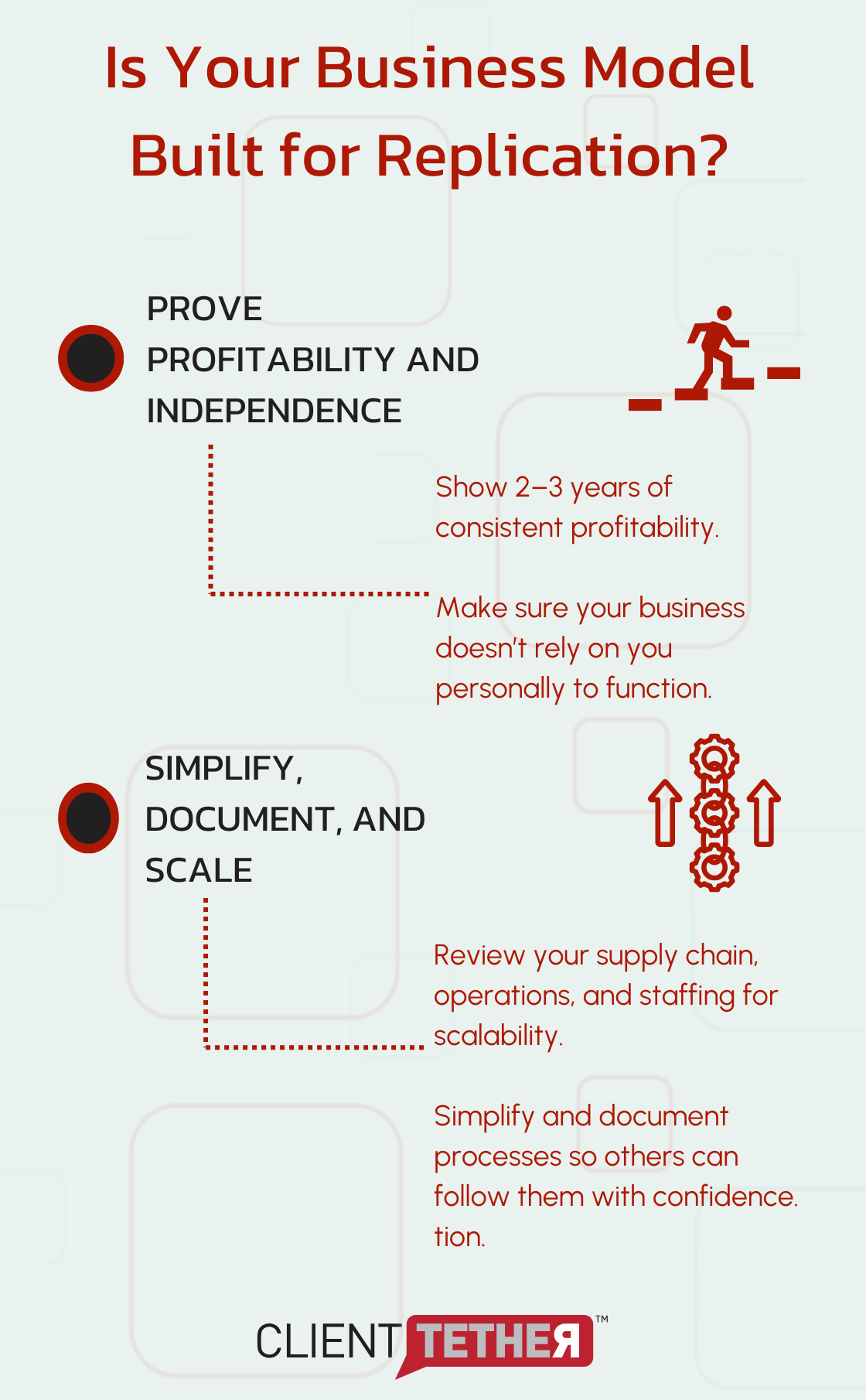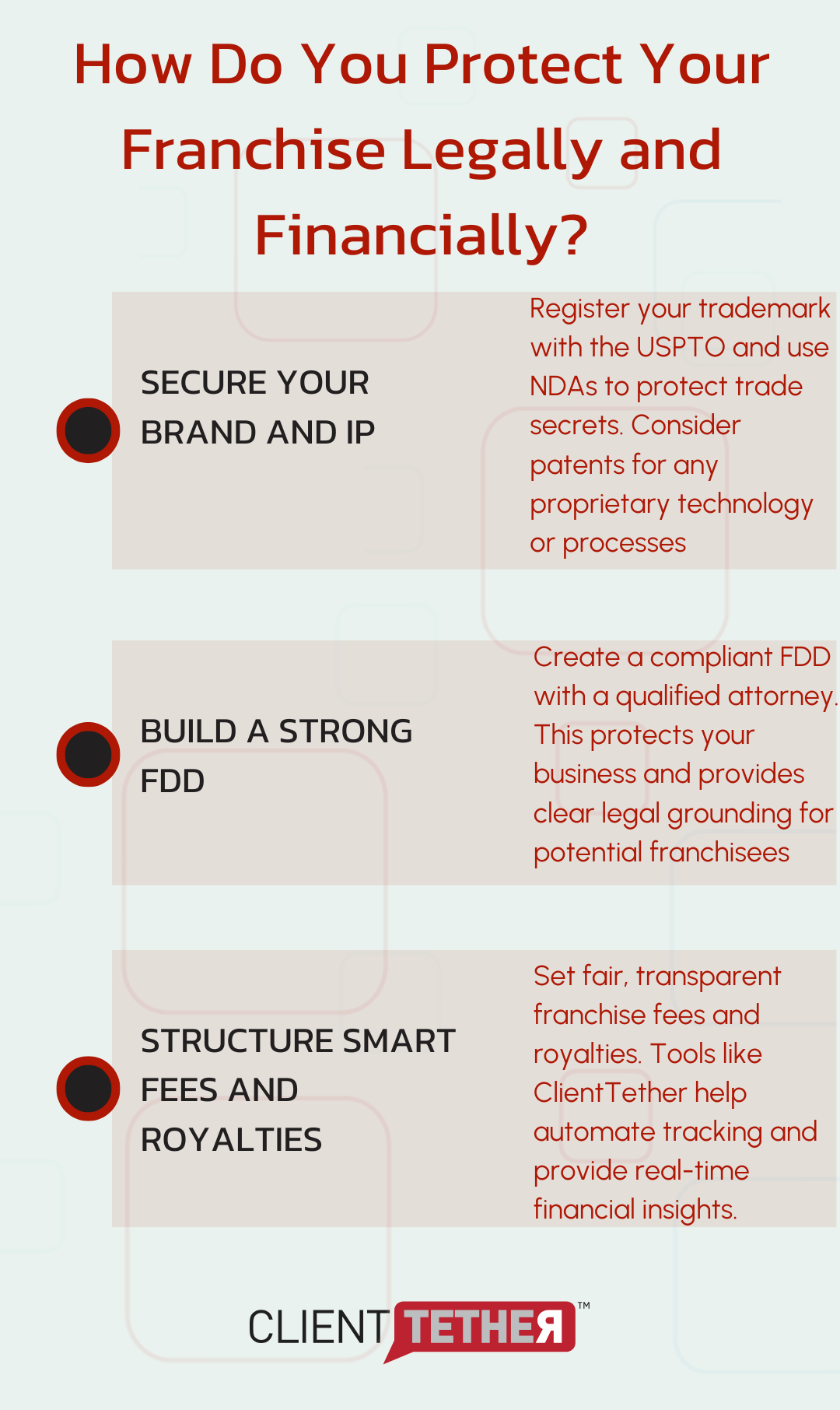If you’re trying to figure out how to franchise a business, you’re not alone. Three years ago, one of our clients was a coffee shop owner with three successful locations. She reached out feeling ready but unsure of the next steps.
That conversation became the foundation for what is now a thriving multi-unit brand. Her success came from structure, data, and commitment. No luck involved.
Franchising your business is a transformation that demands systems, support, and strategy.
In this guide, we’ll walk through what it really takes to become a franchisor. You’ll learn how to evaluate your readiness, document your operations, navigate legal requirements, and build a model that’s built to scale.
If you’ve ever asked whether your business could become a brand others can grow, you’re in the right place.
Is Your Business Ready for Franchising?
Assess Profitability and Scalability
Franchising isn’t suitable for every business. You need to evaluate your business thoroughly before you decide to franchise. This step will help you avoid costly mistakes and increase your chances of success.
Start by examining your finances. Your business should demonstrate a proven track record of profitability for at least two to three years. The International Franchise Association guides what to evaluate before considering franchising.
Profitability is only part of the equation. To franchise successfully, your business model needs to be scalable. It should function well in multiple locations without depending on you personally to make it work.
Look closely at your supply chain, daily operations, and staffing structure. Can someone else step in and follow your systems with confidence?
If your business relies too much on your expertise or relationships, take time to simplify and document your processes. Franchising works best when others can replicate your success without needing your direct involvement.
Analyze Market Demand and Competition
Next, scrutinize your market. Does a sustained demand exist for your product or service? Examine industry trends and growth projections. The U.S. Census Bureau and industry-specific reports can offer valuable data.
Don’t overlook your competition. How saturated is the market? Is there room for your concept to grow?
Just as important, what sets your business apart? A unique selling proposition isn’t optional. It’s the reason franchisees will choose you and customers will keep coming back.
This is where the Purple Cow concept comes in. Yours needs to be remarkable. That might be your customer experience, your social impact, your signature product, or something else that people remember and talk about.
Define that quality clearly. Then build systems that help franchisees deliver it with consistency and confidence, wherever they operate.
Evaluate Business Model Replicability
Lastly, assess how easily others can replicate your business. Your operations should follow standardized and documented procedures. Can you effectively train others to run the business?
If your processes are overly complex or depend on specialized skills, franchising might prove challenging.
Consider establishing a pilot franchise to test your model. This approach allows you to identify and resolve issues before full-scale expansion. Many successful franchises (like Subway) employed this strategy before rapid growth.
Franchising requires significant commitment. It demands a robust system, ongoing support, and substantial resources. If you’re uncertain about your readiness, try working with a franchising consultant or using a franchise management software. Such tools can streamline operations, boost sales, and provide valuable insights as you prepare for franchising.
A thorough evaluation of your business will position you to make an informed decision on how to franchise. This careful assessment lays the groundwork for developing a solid franchise system, which we’ll explore in the next section.

Building a Robust Franchise System
Craft Comprehensive Operations Manuals
The cornerstone of any successful franchise is a detailed operations manual. This document serves as the blueprint for your franchisees, guiding them through every aspect of running the business.
Franchises have a high success rate, and a comprehensive operations manual contributes to this success.
Your operations manual should serve as a practical guide for franchisees. It needs to cover everything from opening and closing procedures to inventory tracking, customer service standards, and financial reporting.
Be sure to include clear steps, not just general instructions. Spell out how each task should be completed to maintain consistency across locations. Define your brand values, tone, and visual standards so franchisees can represent your business accurately.
And don’t let it sit on a shelf. Review and update the manual regularly to reflect industry trends, operational improvements, and lessons learned along the way.
Design Effective Franchise Training Programs
Franchise training maintains consistency across your franchise network.
Start with an intensive onboarding program that covers all aspects of your business model. This might include classroom sessions, hands-on training at an existing location, and online modules. Consider a mentorship program where new franchisees learn from experienced ones.
Ongoing training is equally important. Schedule regular workshops, webinars, and annual conferences to keep your franchisees updated on new products, services, or operational changes.
The right franchise management system can help you track training completion and performance metrics.
Implement Rigorous Quality Control
Maintaining consistent quality across all franchise locations is essential for brand reputation. Develop a comprehensive quality control system that includes regular audits, mystery shopping programs, and customer feedback mechanisms.
Set clear performance standards and key performance indicators (KPIs) for your franchisees. These might include customer satisfaction scores, sales targets, or operational efficiency metrics.
Regular evaluations help identify areas for improvement and allow you to provide targeted support where needed.
Establish Marketing and Branding Guidelines
Create clear marketing and branding guidelines to ensure consistency across all franchise locations. This includes logo usage, color schemes, advertising templates, and social media policies.
Provide franchisees with approved marketing materials and campaigns to maintain brand integrity.
Encourage franchisees to participate in local marketing efforts while adhering to brand standards. This allows for customization to local markets while maintaining overall brand consistency (some franchisors allocate a percentage of royalties to a marketing fund for national advertising campaigns.)
Develop Support Systems
Implement robust support systems for your franchisees. This includes technical support, operational assistance, and financial guidance. Consider establishing a dedicated support team or help desk to address franchisee concerns promptly.
Utilize technology to streamline support processes. A comprehensive franchise management software can automate many support functions, from lead management to customer retention programs. This not only improves efficiency but also provides valuable data for decision-making.
Once your systems are in place, it’s time to tackle the legal and financial side of franchising. This next phase is critical for protecting your brand, staying compliant, and building a solid foundation for long-term growth.
Navigating Legal and Financial Waters
Protecting Your Intellectual Property
Register your trademark with the United States Patent and Trademark Office (USPTO). The process involves several steps and timeframes for processing a trademark application and maintaining a trademark registration.
Patent unique processes or technologies. Protect trade secrets (like your secret sauce recipe) through non-disclosure agreements (NDAs) with employees and franchisees.
Creating a Comprehensive Franchise Disclosure Document
The Franchise Disclosure Document (FDD) acts as your franchise’s bible. U.S. law requires this document, which must include 23 specific items, from your business background to financial statements.
Work with an experienced franchise attorney to create your FDD. This ensures compliance and protects your interests. While expensive, this investment prevents costly legal issues in the future.
Structuring Fees and Royalties
Your fee structure impacts your franchise’s appeal. Initial franchise fees typically range from $20,000 to $50,000 (depending on your industry and brand strength). This fee covers the right to use your brand and business system.
Ongoing royalties usually fall between 4% to 8% of gross sales. Some franchisors prefer a flat monthly fee. Consider your operational costs and profit margins when setting these rates. A Franchise CRM helps track these finances efficiently across your network.

Ensuring Regulatory Compliance
Franchise laws differ by state. Some states require franchises to register with their state before you can award franchises there.
These states are known as registration states and have particularly strict regulations. These states are California, Hawaii, Illinois, Indiana, Maryland, Michigan, Minnesota, New York, North Dakota, Rhode Island, Virginia, Washington, and Wisconsin.
Budget for additional legal fees to navigate these state-specific requirements.
The FTC’s Franchise Rule serves as your federal guidebook. It mandates that you provide the FDD to potential franchisees at least 14 calendar days before they sign any binding agreement or pay any money.
This process is known as disclosing. Be sure to refer to the franchise rule for the proper way to disclose.
Update your FDD annually and whenever significant changes occur in your business. Failure to do so can result in hefty fines and legal troubles.
Implementing Financial Management Systems
Set up robust financial management systems to track revenue, expenses, and profitability across your franchise network. This includes standardized accounting practices and regular financial reporting from franchisees.
Consider implementing a franchise management software (like ClientTether) to streamline financial operations. Such tools can automate royalty calculations, generate financial reports, and provide real-time insights into your franchise’s financial health.
How to Franchise FAQ: What Most Guides Don’t Tell You
How do I scale operations once I start franchising?
Selling a franchise is one thing. Supporting it is another. You need systems that track processes, performance, and communication across locations—without duct tape. This is how you protect your brand while you grow it.
What tech do I need to run a franchise?
If your CRM doesn’t speak the franchise language, it’s the wrong CRM. You need tools that manage leads, automate follow-up, onboard new franchisees, and keep operations consistent across locations, all in one place.
How should I onboard new franchisees?
Forget the binder full of PDFs. Onboarding should be a guided experience, with checklists, automated tasks, follow-ups, and training touchpoints that actually stick. Consistency here means stronger franchisees and fewer headaches later.
What’s the financial reality of franchising?
Franchising scales revenue and responsibility. Without the right systems, support costs can eat into your margins fast. Automating the busywork keeps your growth clean, lean, and profitable.
How do I generate leads to sell franchises?
If you don’t have a lead-gen machine, you don’t have a franchise system. Ads, brokers, referrals, they all work. But only if your follow-up does. Automating your lead response is a matter of survival.
What about legal compliance?
Your Franchise Disclosure Document (FDD) isn’t a set-it-and-forget-it. Every time your operations change, your legal docs should, too. Clean backend systems make staying compliant way easier.
How do I keep franchisees happy and successful?
Support is the difference between thriving franchisees and angry phone calls. Proactive communication, clear task management, and real-time visibility into performance are how great brands keep great franchisees.
Bringing It All Together
Franchising your business is not just a matter of growing fast, but smart scaling what works. That includes your systems, your service standards, and the values that set your brand apart.
This kind of expansion starts with a business that’s both profitable and easy to replicate. It takes careful planning, legal protection, and a shift in mindset. You’re not just running a business anymore. You’re building a brand others will carry forward.
Time and focus are limited. Use them to build the structure and support to help your franchisees succeed. A reliable franchise management platform like ClientTether can help you stay organized, drive consistency, and grow with clarity.
The potential is real. Your next move is about turning a strong foundation into something scalable.




